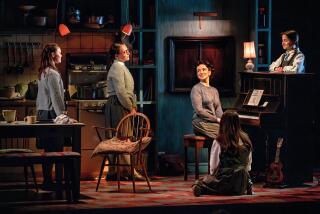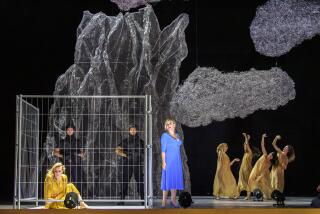STAGE REVIEW : UCI’s ‘Medea’ Veers Toward Melodrama
- Share via
UC Irvine’s “Medea” starts off promisingly enough: The opening speech, delivered with conviction and control by Sarah Salisbury as Medea’s nurse, portends Euripides’ mythic themes of vengeance and infanticide.
Salisbury sidles over Cynthia Felice’s gloomy set, a cagelike enclosure of draping metal net that serves as the outcast Medea’s refuge. Medea herself huddles in the background, a sorceress fighting her rage. The chorus hovers in the shadows, a cool echo. The entire cast wears grotesque masks, and the anonymity orients our attention toward the language.
Director Constantine Arvanitakis appears to be on stable ground. But everything soon gets slippery. Much of the unsteadiness comes from the acting, especially by principals who seem uncomfortable with “Medea’s” dramatic demands: Greek tragedy requires a tightrope walk between drama and melodrama, and too often this production veers toward the latter. The student cast shows potential, but its inexperience is a big stumbling block here.
Furthermore, Arvanitakis, though a director with some wit, makes a confusing stylistic decision when he clothes King Creon in what appears to be Mafioso gear, complete with spats and walking cane. His lieutenants wear trench coats and gas masks. But Medea’s frayed wrap and the chorus’s simple costumes (by Matt LeFebvre) are more traditional. It is a jarring transition.
Arvanitakis may be trying to underscore Medea’s status as an outsider in Creon’s kingdom, a world that Jason, the husband who deserted her, will enter by now marrying Creon’s daughter. If so, the point is not a sharp one. It is good to take visual chances with classic theater, but to pull it off there must be some connection with what is going on, or at least some consistency.
In the production’s favor, Arvanitakis has made the story clear for a modern audience. He has updated some of the language, which makes the plot easier to follow by anyone who may be unfamiliar with the cadences unique to the Greek form. There are lines that seem oversimplified or casual, but the general treatment helps more than hinders.
As Medea, Sarah Dacey must convey a woman on fire with a passion that leads to an unbelievable crime. Medea must be a throbbing nerve--and Dacey is, through wild energy.
But she fails to reveal the profound internal aspects of this woman, a creature so cruelly knotted that she finds satisfaction in destroying Jason by destroying his children, even though they are also her own.
The final scene of “Medea” is one of the most dynamic (and confounding) in classic drama: Medea, with blood still on her hands, is embraced by the gods as Jason implores Zeus for justice.
Even Aristotle complained that the ending was “illogical,” to which Euripides replied that that was exactly the point--the world is a place of violent caprice, and we can’t depend on the Gods for relief.
Except for a bumble in the last second, Arvanitakis handles this denouement nicely. Medea is raised on the shoulders of the chorus and bathed in blood-red lights, and her elevation is felt as well as seen. Despite the heavy-handed theatricality of Medea’s final advance toward the audience, where she holds the skulls of her children, these images are potent.
‘MEDEA’
A UC Irvine production of Euripides’ tragedy. Directed by Constantine Arvanitakis. With Sarah Salisbury, Carolina Karimi, Saman Karimi, Steve Morgan Haskell, Sarah Dacey, Joel Goldes, Mark Nash, Larry Biederman and James Calleri. Set by Cynthia Felice. Costumes by Matt LeFebvre. Lighting by Monique L’Heureux. Plays Thursday through Saturday at 8 p.m. and Sunday at 2 p.m. at the campus’s Fine Arts Studio Theatre. Tickets: $4 to $6. (714) 856-6616 or 856-5000.
More to Read
The biggest entertainment stories
Get our big stories about Hollywood, film, television, music, arts, culture and more right in your inbox as soon as they publish.
You may occasionally receive promotional content from the Los Angeles Times.










